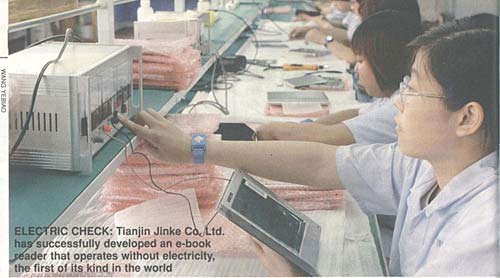|

On May 13, Mo Xiaoli, a student from the Beijing Institute of Technology (BIT), borrowed two reference books from the school library in her dorm room, by downloading electronic editions of books from the school's online library.
With the rapid development of the Internet and the increase of Internet "neti-zens," the Chinese digital publishing industry is-growing fast. In April, the total publishing volume of China's electronic books, or e-books, reached 148,000 titles, the most in the world. Last year, the e-book market had more than 8 million copies of books in circulation. Also in the past year, there were 26 presses netting 300,000 yuan ($36,231) in profits from e-books, with 15 of which reaping 500,000 yuan ($60,386) and five 1 million yuan ($120,772) each.
Electronic books are widely used in libraries, and the number of digital libraries nationwide now exceeds 1,000. The prevalence of online e-books has attracted tens of millions of readers. Additionally, a mobile electronic publishing market is beginning to take shape with content being made available for portable devices such as cell phones and handheld PDAs.
Development potential
An e-book is an electronic version of a traditional print book that can be read on a personal computer or mobile devices using special "reader" software. They are fulfilling public demands for reading materials in electronic form, and even add new technological enhancements, such as intelligent search functions.
Digital publishing is a burgeoning industry, quickly developing the world over. It is reported in Jiefang Daily that one-fifth of the Japanese economy is driven by the digital content industry (digital content may refer to the sum of all the information resources found on the Internet and is also used to describe the text, graphical, audio and video materials found on a particular website). In South Korea, the digital content industry has increased by 40 percent annually, while in the rest of the world by 33.8 percent on average. In China, the number of Internet users is increasing in dramatic fashion with more than 90 million users and 36 million computers connected to the Internet at the end of 2004. The output value of industries related to Internet publishing was 2.5 billion yuan ($301.93 million) in 2003 and further rose to 4.7 billion yuan ($567.63 million) in 2004. This helped yield more than 30 billion yuan (about $3.62 billion) in the output value of IT, telecommunications, media, education and other related industries last year. Meanwhile, the number and variety of portable devices for downloads and for receiving radio and TV programs over the Internet is growing at a great speed. However, digital publishing is far from fulfilling its potential.
But the digital publishing market is attracting more enterprises. Surprisingly, new e-book titles now outnumber traditional paper book titles. Last year, the ratio of e-books to traditional paper books published in China was 127:100, with 140,000 titles for the former and 110,000 for the latter. Take Peking University Press for an example. Last year, it published 658 paper book titles and 4,598 e-book titles.
According to an estimate delivered at the 2005 China E-Book Industry Annual Meeting, nearly half of all online bookstores will be selling e-books by 2008, and more than 80 percent of China's netizens will buy e-books over the Internet. By 2018, e-book retail selling will be conducted by bookstores, airports, railway stations and other outlets nationwide, where people can buy e-books as easily as buying paper books.
The biggest problem for e-book publishers and authors, according to experts, is the lack of copyright protection on the Internet. Sun Shoushan, spokesman with the General Administration of Press and Publication of China (GAPP), noted that imperfect Internet regulations allow the unchecked distribution of e-books, which is detrimental to the interest of writers, publishers and booksellers. Ultimately, more time and money will have to be spent fostering a better market environment before e-books can really flourish, said Sun.
Hurdles to development
In the digital publication market, insiders have recognized the following problems: imperfect copyright protection, a lack of standards and a need for further improvement in the industrial chain.
In the e-book library of the Beijing Institute of Technology, there are 3,000 volumes available for lending. However, Mo Xiaoli and her fellow classmates still complain that there are too few titles and the content is relatively old compared to the millions of paper books collected in the library.
Mo is a computer technology major. It is urgent for students with that major to keep apprised of advanced overseas technology. But the fact is that the publication of e-books is always several years behind paper books, which means the value of the former will always be discounted.
As a result, Mo said she hopes the publication speed of e-books will catch up with that of paper books, and the two can be published simultaneously.
|
